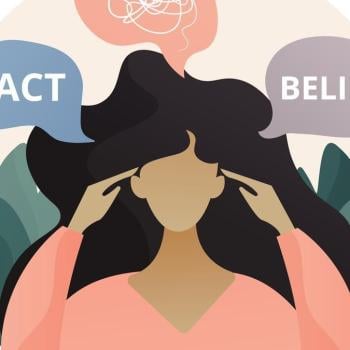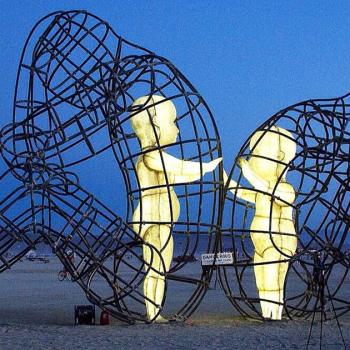
It’s easy to sneer at those who’ve reached opposite conclusions to the ones we hold dear. From both sides of the atheist/theist fence, missiles are regularly thrown, but progress can only be made on the basis of mutual respect, and seeking to learn from one another.
Atheists are courageous people. It takes guts to resist the draw of theism, with all its promises of comfort, and the glowing beacon of a promised afterlife. It takes conviction to hold to your views when they might put you in danger of hellfire, if you are wrong (depending on the belief system that has been rejected).
Among atheists, those whose bravery I most admire are apostates – people who’ve chosen to reject the religion of their parents and/or their upbringing, knowing that doing so will have serious, personal consequences. I think of a friend I knew in a past workplace, whose whole family rejected her when she stepped away from Hinduism (to embrace Buddhism), and another chap, whose atheism and homosexuality made his Muslim home a trying place to be. It takes integrity to say ‘I do not believe’, under such cultural and relational pressures.
Most of all, I think about a dear friend called Gavin. I was introduced to Gav by a mutual friend, at a time when he considered himself a Christian. We got on straight away; an easy, natural friendship that fast became one of the closest in my life. We used to pray together and talk of spirituality, but over time it became clear that Gavin was moving away from faith. I remember painting a room together, in the house we once shared, and realising as he spoke that Gavin had little or no belief in Jesus, without which it is difficult to label oneself a Christian. I challenged him, but not in a condemning way. I just pointed out he didn’t hold to Christian beliefs anymore, and asked if he thought it made sense to continue to call himself a Christian?
It was a light bulb moment for Gav, and over the next few days, he acknowledged his atheism for the first time. It was like coming out, for him – a tremendous relief, to be honest with himself and the world at last. I can’t say I was delighted, but I love Gav, and could see how much happier he was, having abandoned pretence. I’ve led a lot of people to faith, over the years, but had never been pivotal in the abandonment of faith until that moment. Gav often jokes that he is a minus point on my heavenly record.
Over the course of the next year, I watched Gav’s atheism evolve. He swiftly became militant, viciously attacking faith, and absorbing confrontational material from other militants such as the lamentably rude Richard Dawkins. There were times we argued, and even one occasion when we really fell out, but Gav needed to go through this exploratory phase, and if truth be told, it did me good.
Gav asked questions I had never considered, and in seeking to answer them, I was shaken to the core. Being shaken is not a bad thing. It sends poorly-thought-out ideas tumbling to the floor, leaving you with that which matters most. Sharing that journey with Gav tested my faith, but after pondering the difficult set of questions and challenges he posed, I found unexpected answers, along with a peaceful acceptance that not everything can be explained in this life, and it’s not my job to banish everyone’s doubts.
Gav married a Christian woman, and they remain happily together to this day, with two wonderful children. He came out of his militant phase, drawn to kinder atheist voices such as Sam Harris, who helps those without faith explore spirituality without reference to religious belief. Gavin learned the power of meditation through mindfulness practices, and has embraced a more balanced, nuanced view of spirituality as a result. He definitely doesn’t believe in Jesus, but he’s respectful towards me, and he remains one of my closest friends to this day. At his wedding, I read out a note from Sam Harris, who was kind enough to respond when I reached out to him, telling him Gav’s story:
‘Dear Gav–
Congratulations on your marriage. I wish you both much happiness together.
Congratulations, too, on finding such good friends. I am very happy to see that some of your relationships have survived your change in outlook. Not everyone is so lucky. Whether religious or not, most people find it difficult to remember that love is the whole point. Seems like you are in good company…
Godspeed, brother!
Best,
Sam’
This went down rather well, as I think Sam highlighted the most salient point about interfaith discussions, including discussions between people of faith and those with none – love is what matters. As a Christian, I want the wonderful, liberating truths that have shaped my life to flow to other people. I want to persuade, to win people to Christ, because that is what I believe is best for any individual. If I didn’t want that, or believe that, I’d be a strange kind of Christian. But it is never right to force belief on another person, or to disrespect their freedom to choose their own path. It is far better to keep an open mind, learning what we can from people of other viewpoints, than to dismiss them as deceived.
Nor is it our place to judge. People have their own journeys to go on, with many twists and turns; who knows what questions will be answered along the way, or where they will end up? It is better to live in honest unbelief, than dishonest belief.
My cousin Jon, who is also an atheist, encouraged me to write this piece. In a recent online discussion, he wrote:
‘Building bridges across belief systems is an acknowledged need, but my sense is that atheists (or agnostics) get rather left out.’
Jon is another person of integrity, who holds to what he believes because that is what seems true, to him, whether or not that belief system brings him comfort. The abandoning of what is perceived as false-consolation is another example of the courage of atheists.
One of the great comforts I know as a Christian is found in grief. A believer’s grief is different to that of the unbeliever, because a believer genuinely feels they will see the person they have lost again. Partings are painful but temporary, and eternity beckons.
When I was twenty-five, I lost a good friend. Alun was profoundly disabled, registered blind, had breathing difficulties, sleep apnoea, and a host of other problems. He was part of our community, in Nottingham, where a group of eight-ten Christian friends shared each other’s lives, worshipped the Lord together, went on holiday together, and loved each other. Alun was a core member of that group, and he was always a joy to be around. He was generous-spirited, kind, and funny, and we all loved him.
One day, Alun’s blood pressure dropped to a crazily low level, and he was admitted to hospital, where they tried to save him, but nothing they did made any difference, and Alun passed away. I wept buckets at his funeral, but that pain was temporary. I certainly don’t feel it anymore, because I know I will see him again. Sometimes, when praying, I mention him to God, and ask him to pass on a message (that might sound strange, but I don’t believe in praying to other human beings, so my only option is the Lord, and I’m pretty sure He doesn’t mind).
When Jesus was about to die, he said this to his disciples. John 16:22,
‘Now is your time of grief, but I will see you again and you will rejoice, and no one will take away your joy.’
This is the nature of Christian grief – we will see them again, and no-one will take away our joy. I will be reunited with Alun; I know it in my bones, and boy will we have some catching up to do!
I cannot imagine the harder, colder pain of grief without that belief. There is a vast gulf between a temporary parting, and believing someone has truly gone, and is no more; thinking that there is nothing left of the person you loved but dust and memory. Atheists are people of courage, to believe so. They have the integrity to reject comfort, when they believe that comfort is false. I, on the other hand, believe that comfort to be real, and find succour in the warmth faith provides. I doff the cap to the brave adherents of atheism, and the courageous choices they make. I honestly can’t imagine life without faith, and don’t know how they do it.
My cousin is right. Atheists have an important part to play when it comes to building bridges between different belief systems. They ask the best questions, helping people like me work out what they do and don’t believe. They shake us, helping us abandon all that is loose and ill-fitting. They sharpen our faith, and just as importantly, our minds, and let’s face it, there can be a dearth of thought in Christian circles, where simplistic, even contradictory ideas are propagated and in need of being challenged. One of the driving forces behind this blog is to challenge thoughtless dogmas, power-hosing them out the way so that Christ may be seen more clearly. I’m grateful to the many intelligent, insightful atheist contributors present here on Patheos, who keep me (and others) honest.
P.S. I recorded a talk on Christian grief during the pandemic, which can be found here. If anyone is in need of the comfort of God, I hope you will find it in this message. Apologies in advance for the video quality.
P.P.S. This post, which explores the availability of grace beyond the grave to those who die without belief, might also be a comfort to those who fear for a loved one’s eternal state.












